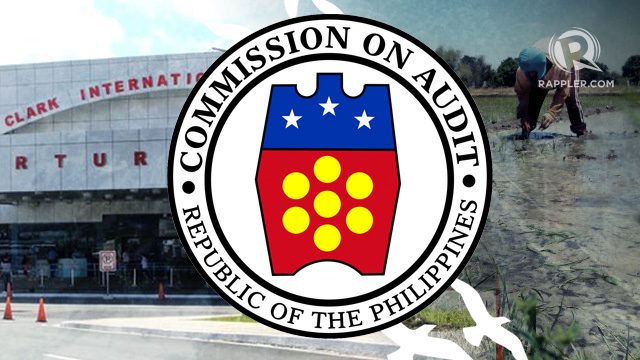SUMMARY
This is AI generated summarization, which may have errors. For context, always refer to the full article.

MANILA, Philippines (UPDATED) – The Commission on Audit (COA) asked state-run Clark International Airport Corporation (CIAC) to explain why millions of pesos were given to relocated informal settlers, and why only 3 families accounted for 66% of the total financial aid.
Records show that P4.893 million went to 3 families who illegally settled inside the Clark Civil Aviation Complex and converted lands into farms. Three Land Bank of the Philippines checks amounting to P2.065 million, P1.763 million, and P1.065 million were released on April 30, 2018.
The combined amount is 66% of the total P7.363 million given to all illegal settlers inside the complex.
COA demanded an explanation from CIAC, saying it must convince state auditors not to issue a notice of disallowance.
State auditors also noted that there is still no certification showing that the occupied areas have been vacated. This is despite millions of pesos already paid out, including P24.345 million in 2009 for illegal settlers who agreed to leave.
COA also pointed out a legal opinion issued in 2018 by the Office of the Government Corporate Counsel (OGCC) which states that the amount of financial assistance should not be based on land measurement occupied, since informal settlers are “not entitled to any indemnity or compensation.”
It added that they should only be given money enough for them to relocate.
“Assessment of the abovementioned payments revealed that these are excessive…given that these informal settlers were illegal occupants having knowledge that the land which they encroached was government-owned,” COA said.
Policy stopped
In a statement on Tuesday, September 17, CIAC denied that COA “sought further explanation” on the matter, but said state auditors indeed raised the question prior to a May 8, 2019 reply by the corporation.
CIAC said it used a 2009 formula to determine the amount given to the informal settlers, adding that the computation took into consideration the “value of trees, crops, and structure plus P50,000 for each bonafide complaint,” thus the varying amount per recipient.
“The computation of financial assistance involves a tedious process of inventory conducted by CIAC along with officials from the Department of Agriculture and the Department of Environment and Natural Resources to determine the number and maturity of trees, crops, and other produce or livestock,” CIAC said.
But CIAC said it stopped implementing the financial assistance policy after the OGCC’s opinion in September 2018.
“At present, CIAC’s standing policy is to offer zero financial assistance or any form of compensation to informal settlers, if at all, and to secure, enclose, and prohibit the entry of unauthorized persons or farm equipment [into] affected areas,” the state-run firm said.
In 2017, CIAC reported that illegal settlers occupied 674 hectares – or 28.75% – of the total 2,367 hectares in the complex. The features they built – homes, trees, gardens – created hazards for aircraft.
From 2010 to 2016, 146 bird strikes were reported, with 50 of those happening in 2016 alone. (READ: COA: Illegal settlers’ farming led to more bird strikes at Clark airport) – Rappler.com
Add a comment
How does this make you feel?
There are no comments yet. Add your comment to start the conversation.